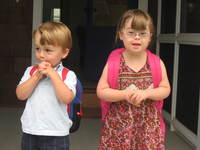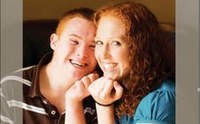In a recent Motherlode post, I wrote about our decision to
forgo prenatal testing for Down syndrome with my third pregnancy. The American
College of Obstetricians and Gynecologists recommend prenatal screening for all
pregnant women, and I am at “higher risk” for having a child with Down
syndrome, due to the fact that our eldest daughter Penny was born with an extra
21st chromosome. In response to my post, many readers wrote about the
“burden” that having even one child with Down syndrome imposes upon a family,
particularly in the later years of life as parents age and children with Down
syndrome become adults. It’s easy to use words like “sweet” and “joyful” and
“blessings” to describe my daughter, but perhaps those words belie an
underlying reality (present or future) of suffering and hardship.
My personal experience only goes so far. Penny is 4 ½. I have one other
child, William, age 2. Soon after Penny was born, as I was
dealing with the shock, fear, and anger that my daughter had Down syndrome, the
practical challenges presented themselves. There were the doctor’s visits. I
resented my intimate knowledge of the Children’s Hospital of Philadelphia, Penny’s
annual trip to the Trisomy 21 clinic, her frequent visits to the cardiologist.
We had special x-rays of her spine in case there was any sign of instability, a
hip ultrasound, a brain ultrasound (all were fine). Penny still needs checkups
every six months on both her eyes and her ears. She’s been hospitalized twice,
both related to gastro-intestinal problems.
It was intense. Four therapists visited our house on a
weekly basis. I kept a chart of all the exercises they suggested, and I
wrestled with constant guilt when I didn’t cycle through the whole list as the
week went on. And I did choose to let my professional goals slow down for those
years, with the knowledge that both the doctor’s visits and therapy sessions would
likely decrease as Penny grew older. (Other parents don’t have the same
flexibility as I did, which doesn’t mean they are forced to choose between
working and caring for their child. The therapists go to the daycare in that
situation.)
Potty-training was our greatest parenting challenge. Due to
low muscle tone and hyposensitivity (difficulty feeling sensation), it took two
years of accidents and extra laundry before Penny could safely leave the house
in underwear. For William it has taken about a month.
Penny is potty-trained now, although still working on the
buttons on her pants. She tells me she’ll learn to unbutton them when she’s
five. We have far fewer doctor’s appointments, and her therapies happen in the
context of her publicly funded preschool program.
Now that I have William as a point of comparison, I can also
say that certain aspects of Penny’s early years were easier. She rarely cried.
She slept ten hours at night starting at seven weeks old. Even her physical
limitations sometimes came in handy. I never had to worry about her climbing
onto a bookshelf and pulling it down on top of her. She was more cautious than
he, so it was William who ended up in the Emergency Room for five stitches in
his ear when he was 13-months old. And parents of adult children with Down
syndrome often comment upon the fact that their son or daughter with Downs is
the “easiest” of the bunch. Although the individual stories will vary (as the
comments on my original post made clear), the overall portrait of family life
with a person with Downs in the mix is a positive one. Harder in some ways,
yes. But good.
It’s hard to specify the joys that come from a child with
Down syndrome. Perhaps I experience even greater pride in her accomplishments
because they once seemed impossible. But my joy as a mother comes, like it does
for any parent, from the small moments of wonder and beauty and human connection.
I think of Penny’s first ballet class. She kept up with the other kids,
pointing and flexing and learning first position. At the end of class, as I was
trying to usher her out the door to our next appointment, she tugged on my
skirt. “No, Mom,” she said, “I need to say thank you to my teacher.” Maybe
that’s a sign of good parenting, although I hadn’t prompted her in any way.
Maybe it’s because of Down syndrome; none of the other kids went back to give
thanks. Or maybe it’s that Penny is her own person–with strengths and
weaknesses, challenges and gifts.
I know, I know. I’m just naïve. As Penny grows up, she’s
going to face the real challenges. According to much of the literature about
Down syndrome, and echoed in many of the comments by readers of my original
post, I will change my tune when she can’t live independently. It is at best
uncertain whether she will go to college or get married, and very unlikely that
she could have children of her own. She may not be able to fully support
herself financially. She has a high likelihood of developing Alzheimer’s at an
early age.
Penny is vulnerable. She is limited. She is needy. That’s
true of all babies, and to some degree all toddlers, and yet it is also true of
many adults with disabilities. Having Penny in my life has made me wonder,
though, how true those words–vulnerable, limited, needy–also are of me.
Sure, I went to college and I have skills that can produce
income for our family. And yet I have had to unlearn one of the things my
education and productivity taught me. Through Penny, I have come to realize
that interdependence is constitutive of my humanity. That it is a gift to me
when I need other people, when I form relationships of mutual giving and
receiving. Similarly, it is a gift when I am able to offer myself in service to
others based on my particular abilities. Having Penny, and interacting with
other children and adults with disabilities, has changed the way I see the
world. Instead of categorizing into able and disabled, I see us all as
interconnected. And I believe that every person has something to teach me, just
as I have something to offer in return.
Is having a child with Down syndrome harder? I suppose the
answer is yes. And yet the largest source of stress associated with having Penny
in my life has nothing to do with her particular needs. Rather, it comes from
knowing that our daughter is entering a world in which people assume they know
her abilities (or lack thereof) simply by looking at her face, with its flat
features and extra fold of skin around her eyes. The hardest thing about having
a child with Down syndrome is knowing that there are people who would compare
her to a dog (as one reader did in a comment to my original post), and people
who assume she takes more from us than she will ever be able to give, or that
she is a “cross to bear” (the religious version of the same sentiment).
I have the privilege of being the mother of a child with
Down syndrome, and through her, being introduced to a world of people who have
taught me more about what it means to be human than my education and productive
life skills ever could. Harder times may come, but I cannot imagine a day when
I would regret her presence in my life, or in our community.


